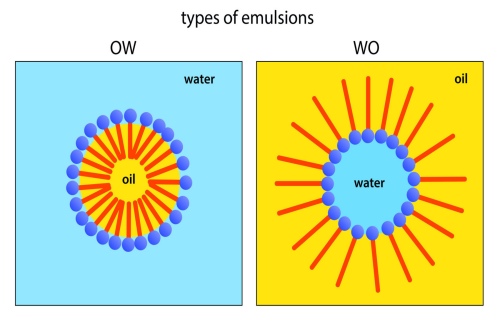The Scientific research Behind Emulsifiers and Their Importance in Modern Manufacturing
Emulsifiers play a vital role in modern manufacturing, acting as the unhonored heroes that blend oil and water for a vast array of items. You may not understand just how these compounds boost appearance and security, but their effect is significant throughout industries. As customer choices change towards cleaner labels, the demand for ingenious emulsifiers is growing. What does this mean for the future of item formulation? Let's explore even more.
What Are Emulsifiers?
Emulsifiers are important representatives in the globe of food and product production, acting as the adhesive that binds two otherwise immiscible fluids, like oil and water. Common instances consist of lecithin discovered in egg yolks and soybeans, and mono- and diglycerides used in numerous refined foods.

When you whip up a salad dressing or indulge in a creamy treat, emulsifiers aid keep that excellent appearance. Without emulsifiers, many foods would certainly divide, leading to unwanted appearances and tastes.
The Chemistry of Emulsification
When you blend oil and water, you may observe they do not blend quickly; that's where the chemistry of emulsification comes into play. To overcome this challenge, emulsifiers are utilized.
When you add an emulsifier, its particles position themselves at the oil-water interface, decreasing surface tension and permitting the droplets to mix. The emulsifier forms a safety layer around each droplet, stopping them from integrating back right into separate layers.
Kinds Of Emulsifiers
Various types of emulsifiers play crucial functions in maintaining mixtures of oil and water. All-natural emulsifiers, like lecithin from egg yolks or soy, are acquired from plants and animals, making them prominent in food items.
On the other hand, artificial emulsifiers, such as mono- and diglycerides, are chemically crafted to enhance security and service life. They're typically made use of in processed foods and aesthetic products.
Furthermore, you might stumble upon non-ionic, anionic, and cationic emulsifiers, each with unique residential or commercial properties that influence their efficiency. Non-ionic emulsifiers, for example, work well in a large range of pH levels, while anionic emulsifiers tend to carry out far better in alkaline problems. Understanding these types can assist you pick the appropriate emulsifier for your specific application.
Systems of Solution Development
Comprehending exactly how solutions create is important for producing steady blends of oil and water. When you present an emulsifier, it lowers the surface tension between the two liquids, permitting them to blend even more quickly.
The emulsifier particles have a hydrophilic (water-attracting) head and a hydrophobic (oil-attracting) tail. When you include an emulsifier, these molecules prepare themselves at the oil-water user interface. The hydrophilic heads communicate with water, while the hydrophobic tails secure right into the oil. This creates an obstacle that supports the droplets, avoiding them from coalescing.
Applications of Emulsifiers in Different Industries
Emulsifiers play an important duty across numerous markets, making your favorite foods smoother and a lot more pleasurable. In cosmetics, they boost product appearance and stability, ensuring a pleasurable application experience. Plus, in pharmaceuticals, they aid provide essential components effectively, enhancing total effectiveness.
Food Sector Uses
While you could not realize it, emulsifiers play a crucial role in the food sector, enhancing the structure, security, and shelf life of lots of items (Emulsifiers). They're commonly discovered in salad dressings, sauces, and mayo, helping to mix Emulsifiers oil and water for a smooth, regular product. In baked products, emulsifiers boost dough handling and retain dampness, causing a better structure and expanded quality. They're also essential in milk items, where they maintain emulsions in creams and ice creams, stopping splitting up. Even in snacks, emulsifiers assist preserve crunchiness and protect against stagnant flavors. By guaranteeing harmony and high quality, emulsifiers are significant to supplying the tasty products you take pleasure in everyday, making them an essential component in contemporary food production.
Cosmetic Formulas Benefits
When it comes to cosmetic solutions, emulsifiers are vital for producing items that feel lavish and carry out properly. You'll discover that emulsifiers boost product stability, protecting against separation and extending rack life. Overall, emulsifiers play a crucial role in providing high-grade cosmetic products that satisfy your beauty needs.
Drug Applications Summary
In the pharmaceutical market, emulsifiers are necessary for formulating effective drugs. They aid produce stable combinations of oil and water, guaranteeing that energetic components are equally dispersed and easily taken in by the body. You'll discover emulsifiers in different dose kinds, like lotions, ointments, and liquid suspensions, enhancing the bioavailability of medications. They likewise enhance the appearance and security of items, making them extra appealing and easier to use.
The Effect of Emulsifiers on Product High Quality

By ensuring stable emulsions, you lower the risk of putridity and prolong rack life, eventually conserving you money and time. You'll additionally locate that emulsifiers can boost the bioavailability of energetic components in your items, making them much more reliable for customers.
Moreover, they allow you to develop cutting-edge solutions that fulfill varied customer requirements. Whether you're crafting a velvety dressing or a glamorous lotion, emulsifiers are vital for accomplishing the desired results. In other words, by understanding and leveraging the read the article influence of emulsifiers, you can substantially boost the high quality of your items.
Future Patterns in Emulsifier Advancement
As the demand for cleaner tags and lasting products rises, the development of brand-new emulsifiers is established to develop considerably. You'll notice a change towards plant-based and natural emulsifiers, driven by customer preferences for ingredients that are eco-friendly and less refined. Advancements in biotechnology will likely improve the functionality and performance of these emulsifiers, enabling manufacturers to develop steady formulations with less additives.
You might additionally see an increase in multifunctional emulsifiers that not just support emulsions but additionally enhance taste, structure, or nutritional worth. This trend might simplify active ingredient listings while boosting product efficiency.
Furthermore, with advances in nanotechnology, emulsifiers might be engineered at the molecular level to attain unmatched security and efficiency. Emulsifiers. Full Article As you discover these trends, you'll locate that the future of emulsifier development is not nearly performance, yet likewise concerning embracing sustainability and openness in active ingredients
Often Asked Inquiries
Are Emulsifiers Safe for Consumption in Food Products?
Yes, emulsifiers are typically secure for consumption in food products. They have actually been extensively examined and accepted by food safety authorities, so you can enjoy your favored foods without fretting about their influence on your wellness.
Can Emulsifiers Be Derived From Natural Sources?
Yes, you can obtain emulsifiers from all-natural resources. Ingredients like lecithin from egg yolks or soybeans and casein from milk prevail. These natural emulsifiers help support combinations without synthetic additives, making them prominent in different items.

Exactly How Do Emulsifiers Affect Shelf Life of Products?
Emulsifiers maintain mixes, protecting against separation and perishing - Emulsifiers. By maintaining harmony, they expand products' life span, ensuring freshness and top quality. You'll see that emulsifiers aid maintain your favorite foods and cosmetics performing well over time
What Are Possible Side Impacts of Emulsifiers?
You could experience digestion problems when consuming items with emulsifiers, as they can interfere with gut microorganisms. Some studies suggest potential links to inflammation or allergies, but extra research is required to totally understand these results.

Are There Alternatives to Typical Emulsifiers?
Yes, there are options to standard emulsifiers. You can check out alternatives like natural gums, starches, or lecithin. Each different deals unique residential properties, so experiment to find what jobs best for your details application.